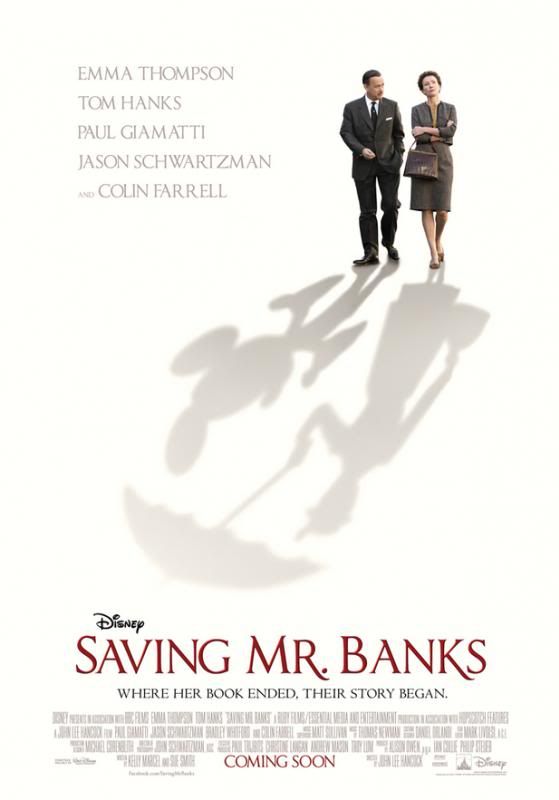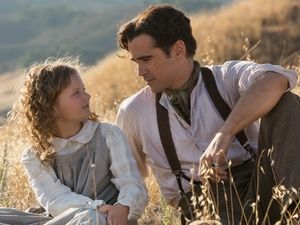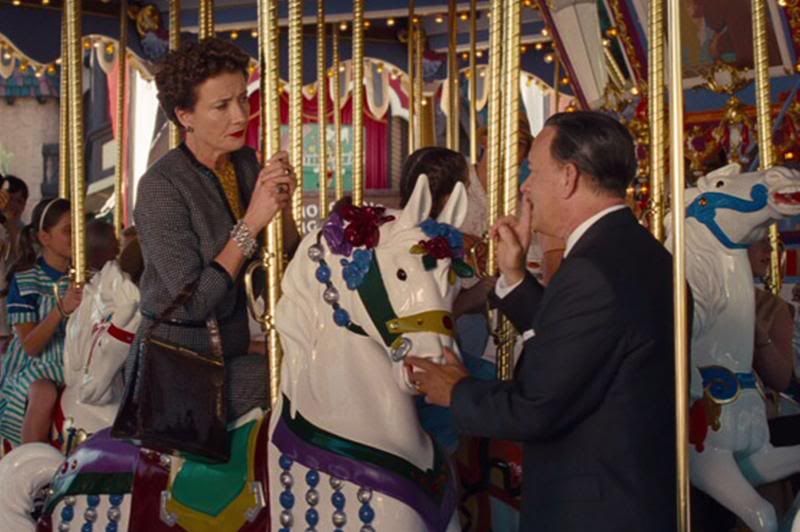Scattershot ramblings on film, video games, anime, and whatever the hell else comes to my mind. If I want to judge tulips, I will.
Sunday, January 5, 2014
Holiday Shuffle: Saving Mr. Banks
Quick, the wind chill's going to drop to -40 by the end of the weekend! I have to see something and then shut myself in my room until the cold goes away… or until I have to go to my real job. Um, uh, let's see… the making of Mary Poppins one. Sure!
Up front, I should tell you that I have little connection to the movie Mary Poppins. I watched it a long time ago and I sang "Chim-Chim-Cheree" as part of a choir in grade school, but other than that, I don't have memories of it, fond or otherwise. I don't have a particular reason why and I'm not about to psychologically prod myself, but I don't have the same sense of nostalgia from Disney's live-action movies other people do. The best I can say is I grew up when Disney flooded the market with some truly horrifying live-action features (Jungle 2 Jungle, anyone?) and then started remaking the ones that weren't that great to begin with and then made them worse (That Darn Cat), so perhaps that put me off them which also had the side effect of pushing aside the great ones.
Hey, you need views from all sides, right? I'm sure there are plenty cinema who people who know Mary Poppins by heart who've chimed in already, so why not from this angle? At its heart, it's still one of those behind-the-scenes things that talks about how much trouble went into the making of a beloved classic and yet things all came together and we have what we have now. People who love Mary Poppins will get all the in-jokes and references and will enjoy tremendously talented actors taking on the roles of the creators. On the other end, people who come from that perspective tend to dislike the "second" movie within it that explains the real story of what inspired the novel, which is told through flashbacks. What struck me was how absolutely necessary this part of the story is to the rest of it working.
Saving Mr. Banks tells the story from mostly the perspective of Poppins author P.L. Travers (Emma Thompson). After 20 years of being courted for the film right by Walt Disney (Tom Hanks), she has to force herself to fly to Los Angeles to finally discuss the matter when her royalties have dried up and she has no new novels on the horizon. Aghast at the what the filmmakers are planning, she records all their conversations during the development and makes heavy, sweeping demands (No musical numbers, Mr. Banks must not have a mustache, no use of the color red, etc.).
While this plays out, we get flashbacks to Travers' childhood in rural Australia. They mostly revolve around her father (Colin Farrell), the inspiration for Mr. Banks in the novel. There are the little touches that inspired the movie, but they have a much different feel with a distinct lack of whimsy and magic. It is an almost cold reality even as the father tries to be as charming as he can be. Why it's important is to give real weight to the reason Travers finds this whole idea of a Disney version so appalling. At one point, they play out the "Fidelity Fiduciary Bank" song as Travers remembers the events that inspired it, and they're so wrenchingly different that it shows why the last thing Travers would want is her work to become a "cartoon." At least in the movie. This is a dramatization, after all.
The person who inspired Mary Poppins doesn't even show up until 85% into the movie, prompting questions as to why, and the answer is really the emotional anchor that drives this movie home. I cannot begin to disagree with the people who think it should've been excised and dealt with via monologue because its tone doesn't jive with the rest of the movie. That's the point. Through the film, Walt tries to appeal to Travers as he was a penniless artist who once faced the prospect of selling his characters to a very rich man and refused, but it's dealt with in monologue and it's not as effective. I think there's a greater film that adds flashbacks to a young Disney dealing with that situation and then turns around to him as an adult on the other end of the table. However, I can see why reducing someone as larger-than-life as Walt Disney to this as a defining moment would seem short-sighted. Also, this is pretty much Travers' story.
So, yeah, the rest of the movie that makes up most of the ACTUAL runtime? You know, the movie everyone's going to see? It's mostly fine. It's not Supercalifragilisticexpialidocious (Thank you, IMDb!), but it delivers the movie most people are expecting. Emma Thompson is pretty much perfect, Tom Hanks is a very solid Walt Disney, and the craftsmanship is very workmanlike from the reliable director Johnny Lee Hancock (The Blind Side). Really, the only big flaw is composer Thomas Newman seems to take awhile to get the right blend between the score inspired by Mary Poppins, sixties jazz, and the score's main theme. Some parts of the score seem to stop midway and switch to something else entirely. It settles down eventually.
Delivering on what people expect can work against a film, though. It's almost like going into a movie after seeing the trailer that explains the whole thing without actually seeing the trailer. There's a big checklist of things movies like this handle and sometimes it feels like it's just going down that list. Cover all the trivia on IMDb, check, make silly in-jokes the characters don't know about yet, check. The one genuine surprise is a small subplot involving a driver played by Paul Giamatti. I won't say anything else, but just keep watching it. It's surprisingly one of the most touching things here.
It probably won't get a lot of award hype just because it mostly hangs out at a "good" level, but I don't see why this shouldn't affect an audience's enjoyment. Sometimes, things aren't a competition. Good is good, bad is bad, and this is pretty dang good.
Subscribe to:
Post Comments (Atom)



Hi,
ReplyDeleteWas just recently dragged along by other half who was exposed to MP as a child. Not something I would normally want to see, as a) I never encountered MP as a kid, and b) loathe all things Disney. Even so, I have to agree with you , pretty good workmanship and a genuinely revealing and interesting story. I too liked the 'driver' storyline. It gives a flash of something quite different in Travers' character. I laughed at the final credits when they played one of Travers' actual tapes. I was suspecting all along that they were hamming up how bad she was to work with . . . no! In real life she was WORSE! How she came away without a souvenir Mickey-Mouse dagger between the shoulder-blades I'll never understand. This film must be good. It made me sympathise with Walt Disney!